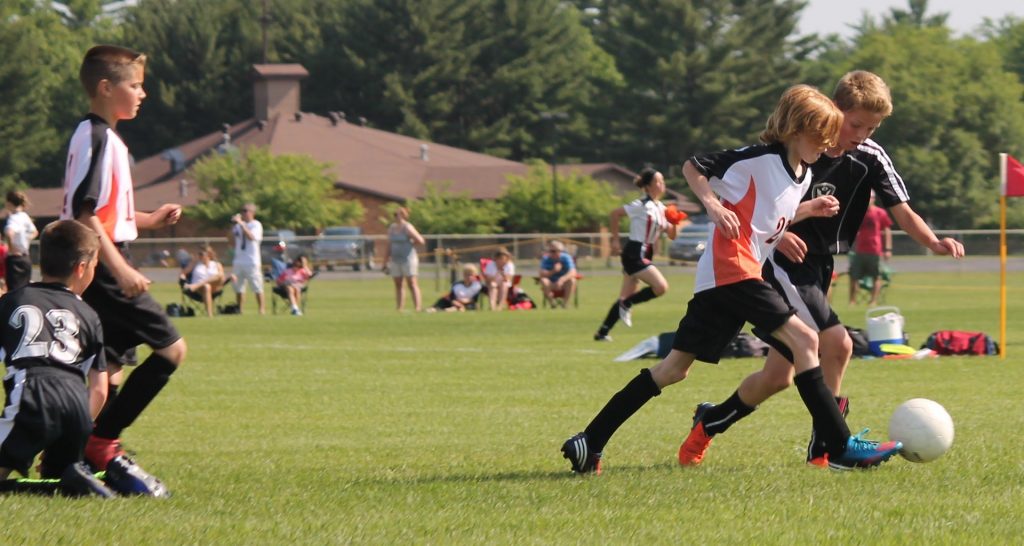At some point in our lives as athletes (or their friends and family), we’ve all witnessed that one spectator angrily rooting from the sidelines as though their life depended on it. We don’t want to believe that this fury-filled fanatic is one of the parents, but most of the time that’s exactly the case. Shaking our heads in disapproval, we head to our own children to discuss the outcome of the game, offering praise or advice as we see fit.

And you know something? Neither approach benefits your young athlete. In fact, despite a controlled volume (read: less profanities) and an advisory stance, each of these scenarios results in the same toxic youth sports culture that permeates athletic participation today. Not yelling is not equivalent to having a positive effect on your child’s active lifestyle. As parents and coaches, we have one simple job to ensure our children continue to enjoy participation in sports: Be supportive.
The Real Reason Behind Toxic Sports Settings
Parents who attempt to coach their children or who frequently discuss results and methods for improvement might think they are already being supportive. However, studies have shown that parents who are overly involved in their child’s athletic life do more damage than those who simply show up for the game and offer appropriate encouragement. In fact, one study characterized parental support as not becoming “over-involved” with their child’s sports participation and instead, providing emotional and tangible support. Researchers found that over-involvement (such as screaming from the sidelines or offering coaching advice) was linked to increased stress in their children.
According to the National Alliance of Youth Sports, 70% of young athletes drop out of team sports by age 13. The reason for this dramatic drop-out rate has been linked to athletes having a poor coaching or team experience. While this coaching can come directly from the coaches themselves, this can also be a result of overly involved parents providing coaching advice to their children.

Why does parental input matter so much to our children? Consider this: Parents are the leading factor in developing self-esteem in children. When parents use this influence to stress the importance of winning, participation, scholarship opportunities, and results, it negatively impacts their children’s self-esteem, leading to a severely decreased self-image. In fact, while we might think that adding a bit of pressure to do better is a good motivator for our children, doing so actually has the opposite effect. Children who experience this kind of pressure on a regular basis and decide not to participate in sports are more prone to developing early onset heart disease, mental and emotional disorders, obesity, and poor social skills.
Preventing Early Drop-Out Starts with Parents
Avoiding being labeled as an over-involved parent doesn’t mean you have to stop being involved altogether. There are healthy, positive ways in which parents can ensure their children not only enjoy sports, but achieve higher levels of athletic performance. Consider the following suggestions outlined by Jim Taylor, author of Raising Young Athletes: Parenting Your Children for Victory in Sports and Life:
- Remind yourself why your kids participate (and it has nothing to do with results).
- Be happy and have fun at events. If you are, your children mostly likely will be, too.
- If you can’t control your emotions at sporting events, don’t go.
- Before an event, if you find that you are stressed, worried, or anxious, stay away from your kids.
- Before a game, don’t try to motivate or coach your kids; nothing you say will help, but a lot you say can hurt.
- Before every game, smile and say, “I love you.”
- After every game, smile and say, “I love you. Do you want a snack?”
- If you find yourself frustrated, angry, or otherwise upset, stay away from your kid until you’ve calmed down.
- Here’s the toughest one: NEVER, EVER talk about results!! I know this sounds impossible, but it can be done (though it takes tremendous willpower). If your children bring up results, just say, “Results don’t matter now. What matters is that you gave your best effort and had fun.”
Perhaps the most difficult challenge parents of young athletes face is refraining from commenting on results and overall performance. As parents, we want the best for our kids, and it’s only natural to want to guide them towards greatness. The problem lies in the fact that more than half of the comments parents make to their children are perceived as negative, instructive, or derogatory in some way — none of which are good for promoting self-esteem and athletic development.
Smiles for Sam
Here at Live Like Sam, we often reflect on Sam Jackenthal’s fun-loving attitude and infectious positivity. At just 15, he won the overall combined title at the U.S. Junior Freestyle Championship. In 2015, he was ranked as one of the top 60 men in the world and top 20 Under-18 free-skiers. For Sam, his achievements were just icing on the cake, consistently placing second on his list of priorities. Yes, he accomplished a lot in his too-short life, but he did so without the immense pressure and stress felt by so many of his fellow free-skiing companions.

Combatting toxic youth sports culture starts at home. With enough practice of their own, parents can contribute to their children’s athletic involvement in more meaningful and positive ways. The next time your child has a sporting event, we suggest following the advice from the CEO one of our partners, John O’Sullivan from the Changing the Game Project: Destress, stay positive, and always tell your child, “I love watching you play.”
The more you practice this, the better your child’s experience will be!
10 Comments
I very much agree that Parents who are overly involved in their child’s athletic life do more damage than those who simply show up for the game and offer appropriate encouragement. This is mostly because we ruin the natural beauty of something when we try to over complicate it.
Thank you for your response, Jamie! We agree that positive involvement in our kids’ sports and activities is important in their development as athletes and as people. That is why we are very happy to partner with Changing the Game Project! The mission of the Changing the Game Project is to ensure that we return youth sports to our children, and put the “play” back in “play ball.” Changing the Game Project wants to provide the most influential adults in our children’s lives – their parents and coaches – with the information and resources they need to make sports a healthy, positive, and rewarding experience for their children, and their whole family.
You can learn more about Changing the Game Project at its website and more about our programs for young athletes here.
Fantastic article and it is true. The biggest challenge facing the parents of young athletes is to refrain from commenting on the results and overall performance. I see no other solution for culture than to put the child in a league focused on teaching the disadvantages of winning/losing.
As a coach for almost 40 years at the high school, collegiate and international levels – there are some good and not so good things in this article. Age and focus is critical and not even touched on. Also, after recruiting thousands of athletes to the collegiate level I can tell you that “parents” are a HUGE part of an athletes development and not from a “let’s get a snack” angle. Toxicity in youth sports is far bigger than a dad talking to his child about the game. If the answer was as simple as smiling and buying ice cream it would have already been fixed.
Quality coaching, athlete development, emotional concern, appropriate communication styles, age appropriate training and the list goes on which does include negative parent interaction. To simplify the youth sports problem to parents talking to their athlete about the most recent competition does a disservice to the real challenges that athletes, parents and coaches face.
It’s a fantastic post, and it’s right. The most difficult task for parents of young athletes is to refrain from making judgments on their children’s outcomes and overall success. I don’t see any other way to change the child’s culture than to place him or her in a league that focuses on teaching the negatives of winning and losing.
This is written fantastically. Parents coaching is undoubtedly dangerous for a child’s skills and sports growth. Instead of improving a child’s skill level, it can further damage.
Hi there! It was great, thanks for sharing awesome blog. I really loved it. Thanks again.
The ripple effects of Frosty Westering and the Pacific Lutheran Football program are a great example of changing lives and this nation through character lessons presented through sport.
It’s okay sometimes to even sit out the big competitions to focus on yourself, because it shows how strong of a competitor and person that you really are, rather than just battle through it,
I absolutely resonated with this blog post! As a parent, it’s vital for us to remember that our children’s sports involvement should be about their enjoyment and personal growth, rather than just the results. It’s a wonderful reminder to be supportive and positive, allowing our kids to thrive in their athletic endeavors. Let’s create a nurturing environment where they can flourish and truly love playing sports. Thank you for this insightful article!